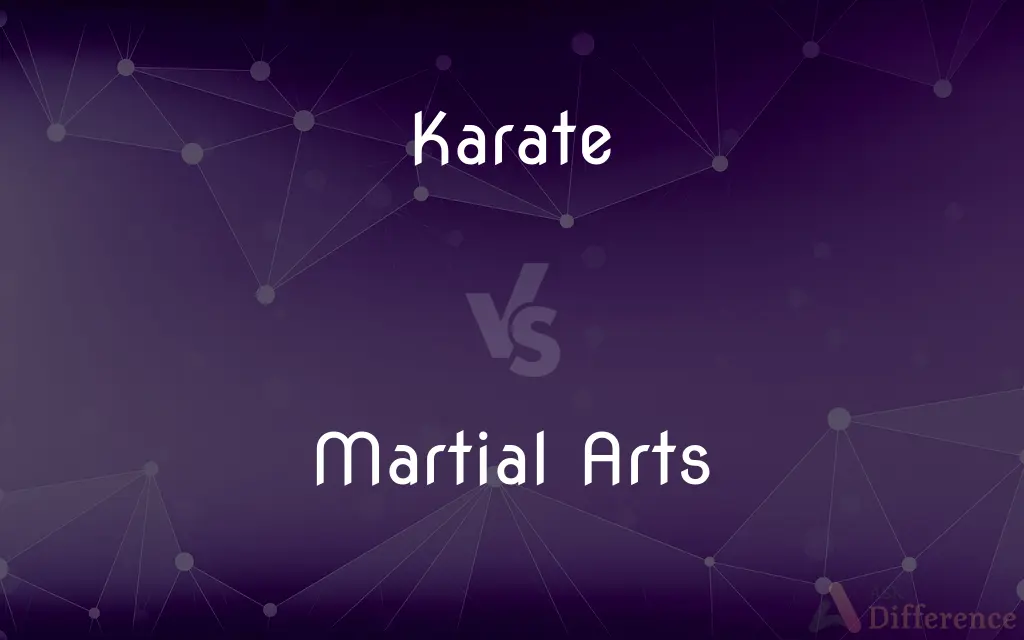Karate vs. Martial Arts — What's the Difference?
By Tayyaba Rehman — Published on October 31, 2023
Karate is a specific form of combat developed in Japan, while Martial Arts encompasses a wide range of fighting systems from various cultures.

Difference Between Karate and Martial Arts
Table of Contents
ADVERTISEMENT
Key Differences
Karate is a distinct style of Martial Arts that originated in Okinawa, Japan. This contrasts with the term Martial Arts, which is a broader term encompassing various fighting techniques, philosophies, and traditions from across the world.
Karate emphasizes striking techniques, such as punches, kicks, knee strikes, and elbow strikes. Martial Arts, on the other hand, may include not just strikes, but also throws, grappling, joint locks, and weaponry, depending on the specific art.
The practices and rituals in Karate reflect its Japanese roots, with customs, attire, and terminology deeply embedded in Japanese culture. Martial Arts, being a global term, draws from a myriad of cultures, from the Brazilian Jiu-Jitsu of Brazil to the Taekwondo of Korea.
Karate typically follows a belt system to indicate rank and progression, from white for beginners to black for experts. While many Martial Arts also use a belt system, others might use sashes, levels, or no ranking system at all.
Comparison Chart
Origin
Okinawa, Japan
Various global origins
ADVERTISEMENT
Focus
Striking techniques
Range of techniques (striking, grappling, weapons, etc.)
Cultural Roots
Japanese
Diverse (Chinese, Brazilian, Korean, etc.)
Ranking System
Typically uses a belt system
Varies (belts, sashes, levels, or none)
Incorporation of Weapons
Limited, e.g., Bo staff
Varies widely depending on the art
Compare with Definitions
Karate
Often associated with a belt-ranking system.
He achieved his black belt in Karate last year.
Martial Arts
Practiced for self-defense, competition, or spiritual development.
Beyond self-defense, many find inner peace through Martial Arts.
Karate
A Japanese striking-based combat style.
She practiced Karate to improve her discipline.
Martial Arts
Combat systems and techniques.
Bruce Lee popularized Martial Arts in Hollywood.
Karate
Incorporates katas or forms.
Each kata in Karate represents a simulated fight against multiple opponents.
Martial Arts
Reflects a cultural or philosophical tradition.
Martial Arts often carry the wisdom of ancient warriors.
Karate
Originated in Okinawa, Japan.
The origins of Karate trace back to Okinawan fighting styles.
Martial Arts
Can be striking, grappling, or weaponry-based.
Martial Arts training can vary from Judo throws to Kendo sword techniques.
Karate
Emphasizes on hand and foot techniques.
In Karate, he learned powerful punches and kicks.
Martial Arts
Includes disciplines from various countries.
While exploring Martial Arts, she trained in Muay Thai and Capoeira.
Karate
A Japanese martial art in which sharp blows and kicks are administered to pressure-sensitive points on the body of an opponent.
Karate
An Okinawan martial art involving primarily punching and kicking, but additionally, advanced throws, arm bars, grappling and all means of fighting.
Karate
To attack (somebody or something) with karate or similar techniques.
Karate
A traditional Japanese system of unarmed combat; sharp blows and kicks are given to pressure-sensitive points on the body of the opponent.
Karate
A traditional Japanese system of unarmed combat; sharp blows and kicks are given to pressure-sensitive points on the body of the opponent
Common Curiosities
Do all Martial Arts have a belt system like Karate?
No, while many Martial Arts use belts, others use different ranking systems or none at all.
Is Karate mainly about striking?
Yes, Karate primarily focuses on striking techniques.
Is Karate a type of Martial Art?
Yes, Karate is a specific form of Martial Art from Japan.
Is Karate suitable for kids?
Yes, many children benefit from Karate in terms of discipline and self-confidence.
Which is broader in scope, Karate or Martial Arts?
Martial Arts is broader, encompassing various combat systems, including Karate.
Do Karate practitioners spar in training?
Yes, sparring is a common practice in Karate to test and refine techniques.
Can Martial Arts include weapons training?
Yes, some Martial Arts disciplines incorporate weapons training.
Can Martial Arts be practiced for non-combat reasons?
Yes, many practice Martial Arts for fitness, discipline, or spiritual growth.
How many types of Martial Arts are there?
There are numerous Martial Arts styles, each with its unique techniques and philosophy.
How long does it take to earn a black belt in Karate?
It varies, but typically several years of dedicated practice are required.
Can Martial Arts training help with mental health?
Yes, many find that Martial Arts training enhances focus, discipline, and overall well-being.
Where did Karate originate?
Karate originated in Okinawa, Japan.
Are there Martial Arts that focus on grappling rather than striking?
Yes, disciplines like Judo and Brazilian Jiu-Jitsu focus on grappling.
Are Martial Arts movies a good representation of real techniques?
While they can showcase techniques, many movies emphasize theatrics over practicality.
Do all Karate schools teach the same techniques?
While there's a shared core, different Karate styles and schools might emphasize various techniques.
Share Your Discovery

Previous Comparison
Quicklime vs. Hydrated Lime
Next Comparison
Smartphone vs. Touch PhoneAuthor Spotlight
Written by
Tayyaba RehmanTayyaba Rehman is a distinguished writer, currently serving as a primary contributor to askdifference.com. As a researcher in semantics and etymology, Tayyaba's passion for the complexity of languages and their distinctions has found a perfect home on the platform. Tayyaba delves into the intricacies of language, distinguishing between commonly confused words and phrases, thereby providing clarity for readers worldwide.
















































